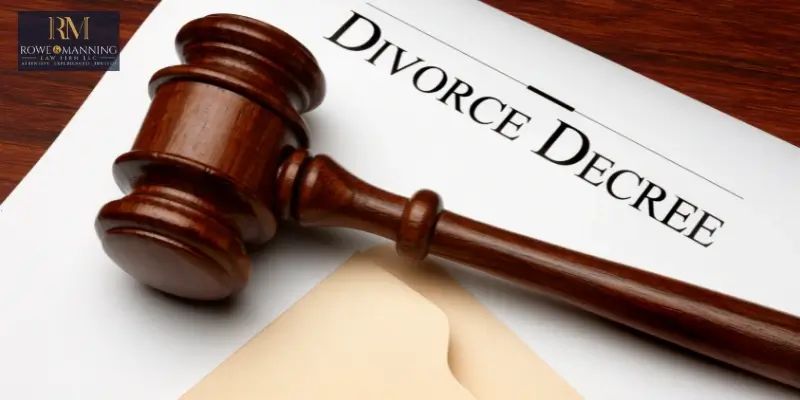Prairieville Divorce Attorney

Divorce law in Louisiana offers a path to end a marriage while addressing property, support, and custody issues. Working with a Prairieville divorce lawyer can help ease the transition. Ending a marriage requires careful planning informed by legal knowledge.
Dedicated to Our Clients’ Success
At Rowe & Manning Law Firm LLC, we provide professional, ethical, and focused representation. Our clients appreciate being informed throughout every stage of their case. We also prioritize courtesy for a smooth experience during challenging times.
Steps in the Divorce Process
While each divorce case is unique, there are many steps in a divorce that most people have to go through. Some of the key stages that many encounter include:
- Filing a Petition for Divorce: The divorce process begins when one spouse files a petition in court. This document outlines the legal grounds for divorce and can include requests for custody, support, or property division. The filing spouse has to carefully consider their claims and demands because this document sets the tone for the whole process.
- Serving the Petition: After filing, the petition is served to the other spouse so that they are notified of the divorce proceedings. This step allows the responding spouse to review the claims and submit an official response. Serving papers has strict legal requirements, and the responding spouse usually has a strict timeline to file their response.
- Temporary Orders: Courts can issue temporary orders to address immediate concerns like custody, support, or living arrangements. These orders usually remain in effect until the divorce is finalized. They can provide stability during the divorce process and can establish precedents that might influence the final settlement.
- Discovery Process: During discovery, both spouses exchange information about assets, debts, income, and other relevant details. This stage creates transparency and fairness when resolving disputes. Discovery can include depositions and requests for documents. It requires serious time and effort to compile accurate information during this stage.
- Finalizing the Divorce: After negotiations or relevant court hearings are hosted, the court issues a final judgment of the divorce. This is a legal document that finalizes the divorce and details the terms of the settlement. It is a binding legal agreement that both parties have to follow, and it could include provisions for future modifications if circumstances change.
Working with experienced professionals can help you work through this transition and can lead to a resolution that respects all parties’ rights and interests.
Asset and Debt Division
Part of most divorces includes identifying all the assets and debts each spouse has. Community property rules, which Louisiana uses for this process, aim for equitable distribution of each property. Community property includes assets like income, real estate, and investments acquired during the marriage, while separate property remains with the original owner. The classification of assets usually requires documentation like financial records or official appraisals.
Conflicts can arise over property division if spouses disagree about asset value or ownership. Courts review evidence and consider factors like each spouse’s financial contributions and needs. This process can be contentious, but it is important so that both parties can move forward.
Spousal Support
Spousal support, also known as alimony, provides financial assistance to one spouse after a divorce. In Louisiana, courts consider factors like the length of the marriage, the earning potential of each spouse, and the standard of living during the marriage. Temporary support is often awarded during the divorce process to address immediate financial needs.
Permanent support is less common and is usually only given to spouses who cannot achieve financial independence due to the long-term nature of the marriage. The court aims to balance fairness while recognizing the financial differences between spouses. The goal is to help both parties keep a reasonable standard of living post-divorce.
Child Custody and Support
When considering child custody and support, Louisiana courts promote the child’s interests and consider things like their relationship with each parent, their unique needs, and other circumstances. Temporary custody arrangements are often established early in the divorce process to reduce disruptions for the child.
Child support calculations follow state guidelines based on parental income and the child’s expenses. These calculations help meet their child’s financial needs, including education, healthcare, and daily living costs.

FAQs About Prairieville, LA Divorce Law
How Are Assets Divided in a Divorce?
Assets are divided in a divorce based on Louisiana’s community property law. This means that any property or assets that were obtained during the marriage are usually divided equally between the spouses. Separate property usually only includes items owned before the marriage or items given to one individual through inheritance. The process often requires determining the classification of assets, which can involve financial records or appraisals.
What Happens to Debts During a Divorce?
During a divorce, debts also follow community property laws. Both spouses share responsibility for things like credit card balances, loans, and mortgages. Courts review each spouse’s financial situation when dividing debts and consider who benefited from or used the funds. If there was a prenuptial agreement created before the marriage took place, it can affect how debts are allocated.
How Is Alimony Determined in a Louisiana Divorce?
Spousal support, or alimony, is determined in a Louisiana divorce based on the financial needs of one spouse and the ability of the other to pay. Louisiana courts consider factors like the length of the marriage, the standard of living during the marriage, and each spouse’s earning potential. Temporary support might be awarded while the divorce is being filed, but permanent support is less common and usually only applies to long-term marriages.
What Protections Are Available for Domestic Abuse Victims in Divorce Cases?
The protections that are available for domestic abuse victims in divorce cases include protective orders to prevent contact or harassment from an abusive spouse. These orders can include provisions for temporary custody, support, and housing arrangements. The court also considers any abuse when making decisions about custody and visitation to prioritize the safety of all parties involved.
Find Structure During Challenging Times
Divorce can reshape a family. Work with an attorney for a fair outcome that supports your future. Schedule a consultation with Rowe & Manning Law Firm LLC for the guidance you need during this dramatic life change.

